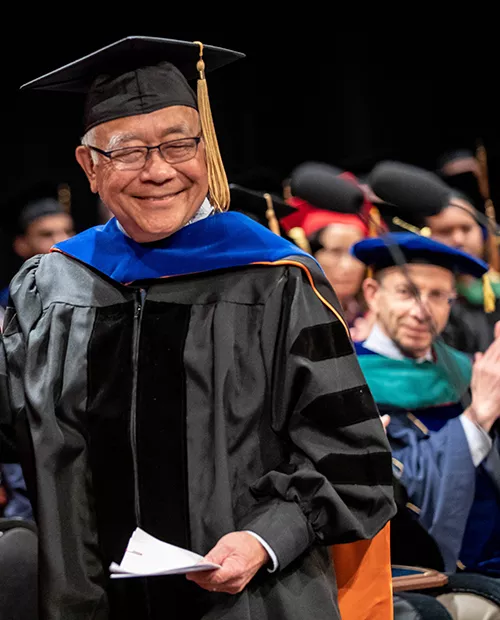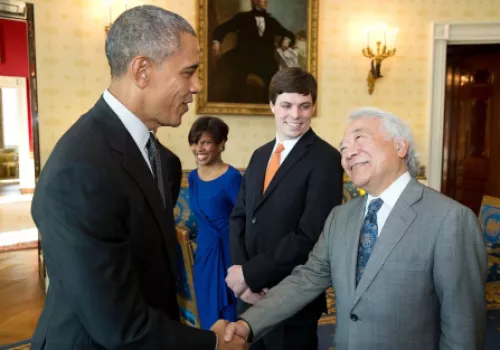This year's Graduate Division Commencement speaker, Dr. Keith Yamamoto, peppered his remarks with humor, but also called on newly minted grads to take very seriously their responsibility to deliver on the promise of science and to demand science-based decisions from leaders in every sector of society.
"Change That We Seek"

Address to the Candidates
Graduate Division Commencement, June 5, 2019
Keith R. Yamamoto, PhD
Vice Chancellor for Science Policy and Strategy
Director, UCSF Precision Medicine
It is an honor to share in this Commencement celebration. Of course, I have fretted about what I should say to you today, but I take some relief from one ghoulish assessment of my place in today's proceedings: the Commencement speaker, it is said, is to Commencement, as the body is to a funeral – the event would be incomplete without one, but no one expects it to say very much.
Now, while my time allotment is mercifully short, don't take my brevity as an indication that I take lightly what I have to say. I want to talk with you about change, Change That We Seek, as I put it somewhat cryptically in the title of my talk (I promise to explain that later). Change, and your role in achieving it.
You are reaching this crucial stage in your lives at a distinctive, remarkable time. And when I say time, I’m referring to two very different time frames or perspectives:
The first time frame is the near term – today, tomorrow. Just how “near term” was driven home to me when I dug up the commencement talk I gave in 2010 at the University of Chicago, and recalled how excited I was to quote, twice, a Chicago native son, who was then the president of the US.
He said this: “Scientific discovery takes the occasional flash of brilliance; it takes time and hard work and patience; it takes training; it requires the support of a nation. But it holds promise like no other area of human endeavor.”
And this: “We are restoring science to its rightful place. The days of science taking a back seat to ideology are over. Our values as a nation are rooted in free and open inquiry. To undermine scientific integrity is to undermine our democracy.”
Well, this is not 2010, this is today…I believe it was Groucho Marx who lamented, "even the future is not what it used to be".
How ironic. You’ve just finished advanced scientific training at this revered health sciences institution, and what is the world you are entering into to use that training?
Today’s president of the United States disrespects truth, distorts evidence, expunges science from public view. He halted an ongoing National Academy of Sciences study on health effects linked to coal mining, and blocked publication of a report on toxic chemicals. He shut down a database of best medical guidelines, and rejected a proposed ban of a pesticide shown to cause neurological disorders in children. He removed data from 31 databases, deleted climate change reports from government webpages, and stripped the term “climate change” from agency communications and grant solicitations. He banned seven phrases, including “evidence-based” and “science-based” from budget documents, and explicitly limited the use of science in policy decisions.
All of this is happening in the grip of social forces that UC Irvine professors Cailin O’Conner and James Weatherall describe in their book The Misinformation Age, in which the high level of trust that the public, and policy makers, have in science and scientists has been compromised by those they call propagandists, who spread fake news and alternative facts that generate persistent false beliefs – beliefs that bring those propagandists wealth and influence and power.
But here’s the important thing: O’Conner and Weatherall found that people’s beliefs are most influenced by connections with those that they know and trust, those who’ve helped them form reliable beliefs in the past. Trusted individuals within a social network that shares many values can present evidence for a view not shared by others in the group, and prove powerfully persuasive. They argue that scientists have special responsibilities in this setting because they, we, you, are trusted experts in evidence-based deliberations about complex problems.
Yuval Harari, in his wonderful book Sapiens, points out that the hunter-gatherers were personally invested in, and trusted, only a few small groups of people, totaling perhaps only about 100 in a lifetime, whereas in modern society we pay taxes, and fight and die in wars, to support hundreds of millions of people we will never meet or lay eyes on.
So in the time frame of today – the misinformation age – it’s interesting that people still form their beliefs in small hunter-gatherer-type affinity groups. It’s just that in today’s fractious times, too many of us retreat into echo chambers around one or two core beliefs, shying away from uncomfortable exploration of other beliefs not shared by the rest of the group.
This means that no matter what your day job is (I’ll get back to that in a moment), there’s an opportunity for you to use your UCSF science training to be a trusted agent – to have an outsized influence among those in your various affinity groups (colleagues, family, friends), to drive change simply by speaking up, and to disrupt misinformation echo chambers with evidence-based, fact-driven conversations that can change minds.
Okay, what about your day job? That brings me to my second time frame, which is none other than the 21st century. I served a few years ago on a National Academy of Sciences committee that crowned this is the Century of Biology. Okay, it was a committee of biologists, but their point was important.
The twentieth century was undeniably the century of physics and chemistry, revolutionizing our lives with light bulbs, air travel, television and mobile phones, but also bringing us oil spills, fast traveling infectious diseases, and global warming. Four massive societal problem areas urgently face us in this 21st century: food/agriculture, environment, energy and health. None has evident durable solutions using today’s knowledge or technologies. What’s more, the problems are urgent and completely intertwined, so they must solved together – solving one while worsening another won’t work.
In this century, suggested the National Academies committee, those problems will be solved only by understanding, and then exploiting, the mechanisms of biological processes, by a New Biology empowered by partnerships with physical scientists, engineers and computer scientists, to generate crops that prosper with little water on non-arable land, clean biofuels, mechanism- and computation-based precision medicine and biotherapeutics, and so on. And importantly, those solutions must be accessible to all, not just the wealthy and privileged.
To get there, we need bold, inspired research that uncovers biological mechanisms, and uses them to create solutions. Some of you will do that research – with jobs in universities and medical centers, and startups and biotech and pharma–extending, or radically disrupting, the basic or health-and-disease-focused research that you’ve begun here, and aware that any of your discoveries in this realm could form the basis of transformational solutions that could address the food, energy or environment problems. The more biology researchers interact and communicate, the better the chances for such synergies.
Clearly, great biological research has great potential, but it’s not enough. If the New Biology is to solve 21st century problems, we must build social structures that empower societies to make informed, wise decisions about how complex concepts and technologies will be applied effectively and ethically. It will require scientists with three core research skills–skills that you’ve honed at UCSF – the ability to identify an important problem, to develop approaches to solving it, and to follow the evidence to an impactful outcome. It will require scientists to use those skills, yes, to do amazing research, but also to fan out across society, using those skills as teachers, lawyers, media communicators, entrepreneurs and venture capitalists, foundation and nonprofit leaders, politicians and policy makers – demanding evidence and using scientific reasoning in every sector, to ensure that society can make difficult decisions wisely, and to deliver on science’s “promise like no other area of human endeavor” as President Obama put it.
What does all this mean for your day job in this 21st century time frame? It means that there’s a long list of essential, exciting careers that need your background, your skills – as a scientist, as a trusted agent. For those of you who know exactly your path forward, fantastic. For those who don’t, know that you have a rich array of options that are not just excellent and interesting, but crucial if we are to reach for a healthy, equitable, prosperous society, if we are to achieve change – the change that we seek.
Ah, I’ve circled back to that peculiar talk title. Where did it come from? It’s lifted from that same past president of the United States. It’s the last phrase of a stirring charge that he issued, and that I’ll leave you with: “Change,” Obama said, “will not come if we wait for some other person or some other time. We are the ones we’ve been waiting for: we are the change that we seek.”
And when he said we, he meant you. You have the opportunity, the imperative, to drive the change that we seek.
Remarkably, even in these complex and difficult times, there are lots of ways for you, as a scientist, to make change happen. Yes, doing it well will ask for your energy and imagination, for spirit and passion, for thoughtfulness and respect, and for courage and mutual trust – no matter what path you take. But you can change the world.
So, congratulations – to your parents, partners and friends for seeing you through your journeys to this day – and of course, to you as you embark on the next stage of your life adventure. And good luck!

As UCSF’s first vice chancellor for science policy and strategy, Keith Yamamoto leads efforts to anticipate the needs of an increasingly dynamic biomedical research endeavor, and to position UCSF optimally, by working within the University as well as influencing and shaping science policy at the state and national levels and beyond. Throughout his career, Yamamoto has been focused on the practice of science, science education and mentoring, peer review, communication of science, and advocacy for federal support for research. Read full bio.
